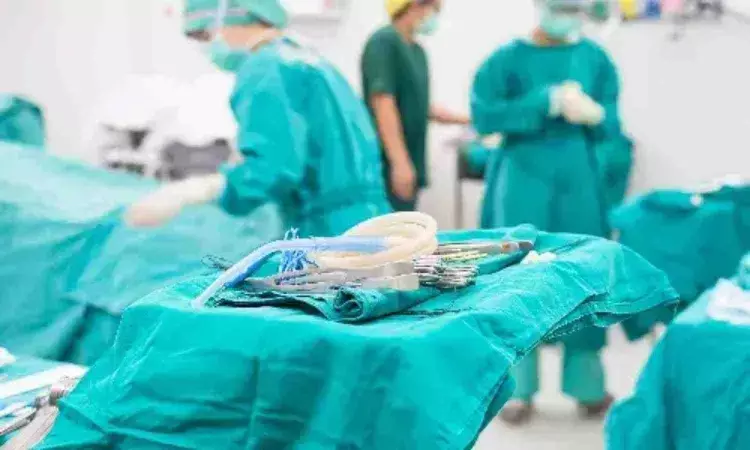- Home
- Medical news & Guidelines
- Anesthesiology
- Cardiology and CTVS
- Critical Care
- Dentistry
- Dermatology
- Diabetes and Endocrinology
- ENT
- Gastroenterology
- Medicine
- Nephrology
- Neurology
- Obstretics-Gynaecology
- Oncology
- Ophthalmology
- Orthopaedics
- Pediatrics-Neonatology
- Psychiatry
- Pulmonology
- Radiology
- Surgery
- Urology
- Laboratory Medicine
- Diet
- Nursing
- Paramedical
- Physiotherapy
- Health news
- Fact Check
- Bone Health Fact Check
- Brain Health Fact Check
- Cancer Related Fact Check
- Child Care Fact Check
- Dental and oral health fact check
- Diabetes and metabolic health fact check
- Diet and Nutrition Fact Check
- Eye and ENT Care Fact Check
- Fitness fact check
- Gut health fact check
- Heart health fact check
- Kidney health fact check
- Medical education fact check
- Men's health fact check
- Respiratory fact check
- Skin and hair care fact check
- Vaccine and Immunization fact check
- Women's health fact check
- AYUSH
- State News
- Andaman and Nicobar Islands
- Andhra Pradesh
- Arunachal Pradesh
- Assam
- Bihar
- Chandigarh
- Chattisgarh
- Dadra and Nagar Haveli
- Daman and Diu
- Delhi
- Goa
- Gujarat
- Haryana
- Himachal Pradesh
- Jammu & Kashmir
- Jharkhand
- Karnataka
- Kerala
- Ladakh
- Lakshadweep
- Madhya Pradesh
- Maharashtra
- Manipur
- Meghalaya
- Mizoram
- Nagaland
- Odisha
- Puducherry
- Punjab
- Rajasthan
- Sikkim
- Tamil Nadu
- Telangana
- Tripura
- Uttar Pradesh
- Uttrakhand
- West Bengal
- Medical Education
- Industry
GLP-1 RA linked to significant gastric contents before anaesthesia and increased risk of aspiration: JAMA

Safety concerns for patients undergoing anesthesia who use glucagon-like peptide-1 receptor agonists (GLP-1 RAs), which are medications approved for diabetes and weight management, were revealed in a UTHealth Houston study published today in JAMA Surgery.
The study was led by first author Sudipta Sen, MD, associate professor; and senior author Omonele Nwokolo, MD, professor, both in the Department of Anesthesiology, Critical Care and Pain Medicine at McGovern Medical School at UTHealth Houston.
“Our findings were quite surprising. More than half of the patients on a GLP-1 RA had significant gastric contents on gastric ultrasound before an elective procedure, despite adhering to preoperative fasting,” Sen said. “This incidence was significantly higher compared to patients not on a GLP-1 RA, showing a strong link between GLP-1 RA drugs and potential aspiration risk under anesthesia.”
The study was prompted by internal quality reviews led by Nwokolo and Srikanth Sridhar, MD, associate professor in the department, after anecdotal cases of aspiration under anesthesia were reported by staff for patients taking this class of medications for weight loss, despite adequate fasting before the procedure. Aspiration is a potentially dangerous condition where stomach contents enter the lungs.
Sen and study co-authors Nadia Hernandez, MD, associate professor, and Christina Goehl, MD, assistant professor, are subspecialized anesthesiologists with expertise in point-of-care ultrasound, which allows bedside assessment of stomach contents. One mechanism of GLP-1 RA medications central to weight loss and glycemic control is slowing of the emptying of gastric contents from the stomach. This increase in residual gastric volumes is identified as a “full stomach” on gastric ultrasound.
This study, designed by Paul Potnuru, MD, assistant professor, examined more than 120 patients scheduled for elective procedures between June and July 2023. Findings revealed that 56% of patients using GLP-1 RAs exhibited increased residual gastric content, compared to 19% of those who did not take the medication. The study further indicated a 30.5% prevalence of increased residual gastric content with the use of GLP-1 RAs.
With the increasing use of GLP-1 RA medications and their expanding indications for treating various conditions, Sen said conventional fasting times for this patient subset may need to be reexamined.
“Patients must ensure they disclose their use of this medication to their surgeons and anesthesiologists,” Sen said. “This information is crucial for us to provide appropriate recommendations, such as adjusting drug administration before elective procedures, recommending extended fasting, or rescheduling an elective procedure if necessary.”
In June, 2023, the American Society of Anesthesiologists released new guidance for screening GLP-1 RA use before surgery and informing patients of the risk of adverse outcomes. Recommendations included the consideration of pausing GLP-1 RAs prior to elective surgery.
“Our study fills a significant gap in the current understanding and management of patients on GLP-1 RAs undergoing surgery,” Nwokolo said. “The lack of data had previously led societies to rely on expert opinion for guidance. Our evidence paves the way for informed guidelines and further research to mitigate anesthesia-related risks in this patient population.”
The study’s outcomes prompt a reevaluation of preoperative protocols in this subset of patients, underscoring the significance of patients openly communicating their GLP-1 RA use before surgery.
Reference:
Sen S, Potnuru PP, Hernandez N, et al. Glucagon-Like Peptide-1 Receptor Agonist Use and Residual Gastric Content Before Anesthesia. JAMA Surg. Published online March 06, 2024. doi:10.1001/jamasurg.2024.0111.
Dr Kamal Kant Kohli-MBBS, DTCD- a chest specialist with more than 30 years of practice and a flair for writing clinical articles, Dr Kamal Kant Kohli joined Medical Dialogues as a Chief Editor of Medical News. Besides writing articles, as an editor, he proofreads and verifies all the medical content published on Medical Dialogues including those coming from journals, studies,medical conferences,guidelines etc. Email: drkohli@medicaldialogues.in. Contact no. 011-43720751


